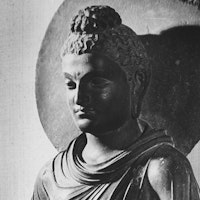To follow the Way and hold to what is true is good. When the Will is in conformity with the Way, that is greatness.
Gautama Buddha

What Is Greatness
Topic: Virtue, Morality, & Ethics
A novice asked the Buddha, “What is goodness and what is greatness?” The Buddha replied, “To follow the Way and hold to what is true is good. When the Will is in conformity with the Way, that is greatness.“
Gautama Buddha, also known as Siddhartha Gautama, was a spiritual teacher and the founder of Buddhism. Born in the 6th century BCE in Lumbini, now modern-day Nepal, he was destined for greatness. At the age of 29, he renounced his luxurious life as a prince and embarked on a spiritual quest to find the ultimate truth about human suffering and the nature of existence.
After years of intense meditation and self-discipline, Gautama attained enlightenment under a Bodhi tree in Bodh Gaya, India, at the age of 35. He became the Buddha, which means "the awakened one" or "the enlightened one." Gautama Buddha spent the rest of his life teaching the Four Noble Truths and the Eightfold Path, which formed the core principles of Buddhism. His teachings emphasized the importance of overcoming desire and attachment to achieve liberation from suffering. Known for his compassion and wisdom, Gautama Buddha's teachings have had a profound impact on millions of people worldwide, inspiring them to seek inner peace and spiritual enlightenment. His legacy as a spiritual leader and philosopher continues to resonate and guide individuals on their spiritual journeys to this day.
Sutra of Forty-two
Wilson, Andrew, editor. World Scripture—a Comparative Anthology of Sacred Texts. Paragon House, 1991, p. 153 [Sutra of Forty-two, Section 15].

Gautama Buddha
Theme: Virtue Is

About This Gautama Buddha Quotation [Brief Commentary]
In the interaction between Gautama Buddha and the novice, we encounter a concise yet layered definition of both goodness and greatness. Goodness, Buddha suggests, arises from a steadfast commitment to “the Way,” a path marked by ethical and spiritual uprightness. Greatness evolves when one’s will—our capacity for choice and action—is aligned with this path.
About This Gautama Buddha Quotation [Longer Commentary]
The notion of virtue is quietly embedded in this teaching. Virtue is not merely about individual actions or moral codes; it’s an integrated way of being. It’s the quality of living a life in line with deeper truths, where both goodness and greatness become attainable. When one’s will is congruent with “the Way,” virtue manifests not just in isolated acts but as a consistent trait.
This concept finds echoes in other traditions as well. In Christian teachings, for example, virtue is described as a harmony between human will and divine will. Here, just as in Buddha’s explanation, the alignment of one’s will with a higher principle allows virtue to flourish. In both cases, virtue is seen not just as a goal but as a dynamic process—a journey along “the Way” that naturally leads to both goodness and greatness.
Andrew Wilson’s Commentary in World Scripture
Related Quotes
Copyright © 2017 – 2026 LuminaryQuotes.com About Us